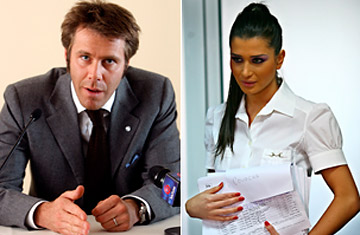
Prince Emanuele Filiberto of Savoy and Romanian Elena Basescu
Europeans often grumble that the European Union is run by anonymous apparatchiks. Surely they're not referring to Prince Emanuele Filiberto of Savoy, grandson of Italy's last King, who is campaigning for this week's European Parliament elections. Or to Rickard Falkvinge, the founder of Sweden's Pirate Party, whose campaign rallying cry is for free file-sharing over the Internet. Or to Elena Basescu, a.k.a. Romania's Paris Hilton — the flashy It girl, who happens to be the daughter of the Romanian President, also wants to become an MEP.
With candidates like these, it's easy to forget that the European Parliament shapes Europe's policies on vital issues like climate change, banking rules and immigration law. Yet when elections roll around every five years, the august body can feel like a free-for-all for fringes, freaks and fanatics. (See pictures of how climate change is affecting Europe.)
Between June 4 and 7, some 375 million Europeans will be entitled to cast votes to elect a new, 736-member Parliament. However, a survey earlier this year found that only 34% of eligible voters are likely to do so. This apathy spurs the rise of the mavericks: since most Europeans still do not know who their MEPs are or what they do, they use their votes instead to punish incumbents. (Read "Why So Few Care About the European Parliament Elections.")
"Voters think the stakes are lower than in national elections — or, at any rate, less clear," says Hugo Brady of the Center for European Reform think tank. "Moreover, the Parliament can often seem distant because few voters know what it actually does. And even if they do, the areas where the Parliament exercises most influence seem technical and dull."
Yet a seat in the Brussels body still appears strangely attractive to a raft of minor celebrities. Among the candidates hoping to be elected or re-elected are former Czech astronaut Vladimir Remek; Finland's four-time winner of the Paris-Dakar rally, Ari Vatanen; Bulgarian Taekwondo champion and nightclub impresario Slavi Binev; and Paul Georg Maria Joseph Dominikus von Habsburg, the grandson of the last Austro-Hungarian emperor. Also making a bid is Gigi Becali, the owner of Romania's Steaua Bucharest soccer club, who is facing kidnapping charges.
However, the fringes also contain more disruptive elements. These range from the U.K. Independence Party (UKIP), which campaigns to pull Britain out of the E.U., to France's Dieudonné M'bala M'bala, a comedian of Cameroonian descent whose declared primary aim is "wiping out Zionism" in the world. The only pan-European party, with 600 affiliated candidates standing across the E.U., is the fiercely Euroskeptic Libertas, led by Irish millionaire Declan Ganley. (Read "How One Man Plans to Sink the European Union.")
These groups could make a strong impact in the elections. UKIP won just 2% of the vote and no seats in the 2005 British general election, but some opinion polls currently put the party ahead of the ruling Labour Party, owing largely to voter disgust over the parliamentary-expenses scandal in London. In the Netherlands, the anti-Islamic Geert Wilders could see his Freedom Party overtake the Christian Democrats of Prime Minister Jan Peter Balkenende. (Read "Dutch Shrug for Anti-Muslim Film.")
But if the mainstream parties are outflanked, they often have themselves to blame. In many countries, the European Parliament is seen as a Siberia for politicians whose day is done in the national arena — hence the decision by French President Nicolas Sarkozy to send his glamorous justice minister Rachida Dati to the assembly because of her high-handed management style and the gossip surrounding her clothes and private life. (See pictures of Sarkozy in the U.K.)
Even when big names top the party lists, they are sometimes figureheads who have no intention of serving out their terms. Italian Prime Minister Silvio Berlusconi, for example, is unlikely to take up his seat if, expected, he is elected — even if Brussels might be a sanctuary of sorts from his major woman problems of late. (Read: "Berlusconi and the Girl: No Spice, Thank You.")
The mainstream parties are also victims of the technical and consensual nature of the E.U. itself. Voters are turned off by the process-heavy, nonadversarial way in which the Parliament operates: there is little difference among the policies proposed by the three biggest groups, the conservatives, liberals and socialists. In the current downturn, they are all seen as having fallen asleep at the wheel while the economy went sour.
"This election is very difficult for mainstream parties," says Antonio Missiroli, director of studies at the Brussels-based European Policy Centre (EPC). "It is complicated to make a case for Europe at this moment. And during the economic crisis, voters feel that someone has to be blamed, whether it is Europe or capitalism in general."
So these elections are largely an outlet for European voters to express their frustration with the status quo. The eccentrics and extremists may offer implausible E.U. policies, but most European governments prefer voters to vent their anger at the European elections rather than at the national polls. The danger is that this mood will shape the Parliament just when a new generation of politicians is needed to pull Europe out of its apathetic slump.
